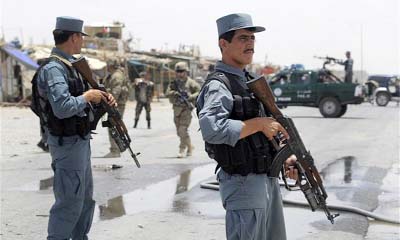
AFP, Kabul :Civilian casualties in Afghanistan hit a record high this year, a UN report said, highlighting worsening violence as US-led troops leave after more than a decade of fighting the Taliban.Casualties jumped 19 percent by the end of November compared to the year before, with 3,188 civilians killed and 6,429 injured, the United Nation’s Mission’s for Afghanistan (UNAMA) said in a report.It warned that civilian casualties were expected to exceed 10,000 by the end of the year, making it the deadliest year for noncombatants since the organisation began issuing its authoritative reports in 2009.Compared to 2013, this year also saw a 33 percent rise in casualties among children and a 12 percent increase among women, according to the report released on Friday.”Civilian casualties are particularly tragic and very prominent part, even benchmark, of the horror of the violence that ordinary Afghans face,” said Nicholas Haysom, the top UN envoy in Afghanistan.While ground fighting between troops and insurgent groups and Improvised explosive devices (IEDs) remained leading causes of deaths and injuries, the Taliban were accountable for 75 percent of all civilian casualties, the report said.As US-led NATO troops prepare to wrap up its 13-year combat mission, casualties among Afghan security forces have also suffered soaring casualties, with more than 4,600 killed in the first 10 months of this year.After NATO’s combat operations end on December 31, a follow-up mission of about 12,500 US-led NATO troops will stay on in Afghanistan to train and support the local security forces now responsible for fighting the Taliban. Another report adds President Ashraf Ghani has promised a complete overhaul of Afghanistan’s government to root out corruption and incompetence, but after three months in office, three missed deadlines and countless promises, he and his election rival-turned-deputy have yet to appoint a single Cabinet minister.The repeated delays have meant that Ghani is single-handedly grappling with a dizzying array of challenges – from a revitalized Taliban insurgency to a reset of long-fraught relations with neighboring Pakistan – and have fueled speculation that he and Chief Executive Abdullah Abdullah, the equivalent of his prime minister, are still at each other’s throats.”They cannot agree on anything, you can hear the shouting from here,” said Mohammad, a Kabul shopkeeper, echoing the belief of many Afghans that Ghani and Abdullah cannot work together.A wide range of sources close to both men, including Afghan associates, officials and Western diplomats, say however that the two have amicably shared the task of selecting potential ministers.Among the hurdles to naming the full Cabinet, according to Ghani’s spokesman Nazifullah Salarzai, is ensuring that the government is wholly representative of Afghanistan’s complex jigsaw of interests.”That requires consultations with all parties, with all interest groups on all issues, including gender issues which have to be navigated carefully. All of the complexities of Afghanistan’s cultural, ethnic and geographic makeup have to be taken into account,” he said.Ghani is eager to build a meritocratic government, his associates said, and move away from the ethos of patronage that characterized the previous 13 years under President Hamid Karzai. Ghani has said he does not want to appoint anyone who has previously held a ministerial post, and that he wants women to assume a number of senior positions.

